河南专升本英语语法复习
河南专升本:语法系列复习专题十一-----状语从句、常用动词及搭配
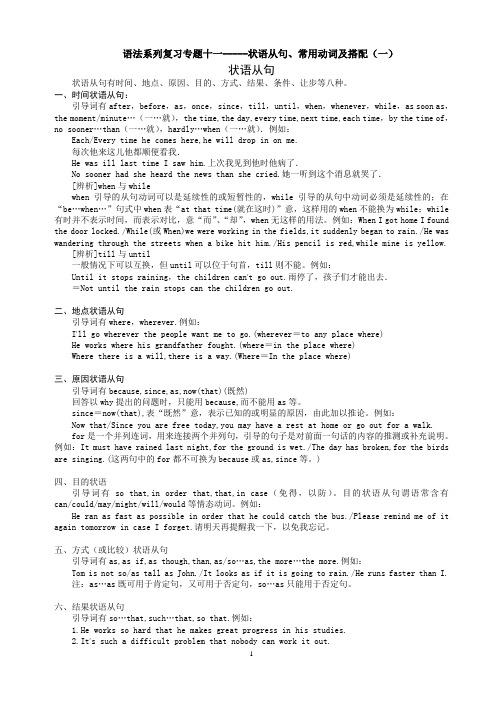
语法系列复习专题十一-----状语从句、常用动词及搭配(一)状语从句状语从句有时间、地点、原因、目的、方式、结果、条件、让步等八种。
一、时间状语从句:引导词有after,before,as,once,since,till,until,when,whenever,while,as soon as,the moment/minute…(一…就),the time,the day,every time,next time,each time,by the time of,no sooner…than(一…就),hardly…when(一…就).例如:Each/Every time he comes here,he will drop in on me.每次他来这儿他都顺便看我.He was ill last time I saw him.上次我见到他时他病了.No sooner had she heard the news than she cried.她一听到这个消息就哭了.[辨析]when与whilewhen引导的从句动词可以是延续性的或短暂性的,while引导的从句中动词必须是延续性的;在“be…when…”句式中when表“at that time(就在这时)”意,这样用的when不能换为while;while 有时并不表示时间,而表示对比,意“而”、“却”,when无这样的用法。
例如:When I got home I found the door locked./While(或When)we were working in the fields,it suddenly began to rain./He was wandering through the streets when a bike hit him./His pencil is red,while mine is yellow.[辨析]till与until一般情况下可以互换,但until可以位于句首,till则不能。
河南专升本语法(一)动词时态语态(学生版)

语法(一)—动词时态语态语法考点分析:从句会占到7-9分,非谓语动词6-8分,这两块基本是15分;虚拟语气2-3分;时态与语态(主要是完成时)会有1分或情态动词的完成体1分,主谓一致1分。
从句中,重要考点是定语从句,定语从句会占到从句中3-4分,其中which引导的非限制性定语从句、只能用that引导定语从句必考;然后是名词性从句,其中主语从句中whether 与if 的区别、whoever的用法、that与what、whatever的区别是主要考点;还有that引导的同位语从句;状语从句中主要是as引导的让步状语从句、as(so) long as\unless\in case\since 的含义及用法、 no sooner…than…\ hardly…when…\ not…until…\ however的用法、比较级中的倍数问题等是必考的。
非谓语动词中现在分词与过去分词作状语、定语与表语的区别是必考的重点。
There is no good/use/point/sense doing…, It is no good /use doing…句型、admit, appreciate, avoid, can’t help, consider, delay, enjoy, escape, mind, recall, resent, resist,, risk, suggest等动词后跟动名词、分词作状语与分词独立结构的区别虚拟语气,if引导一般虚拟条件句中对过去的假设、用should表虚拟、常用的虚拟语气句型:would rather, had rather, would as soon、It is (high/ about ) time(是……时候了)、动词wish后的虚拟语气、but for, lest, if only后的虚拟语气是重要考点。
主谓一致考点解析:就远法当主语与with, along with, accompanied by, in addition to, together with, including, as well as, like, besides, rather than。
河南专升本考试英语语法系列复习专题——动词时态,被动语态

河南专升本考试英语语法系列复习专题——动词时态,被动语态一、普通如今时1.普通如今时表示经常发生、适应性动作、客观真理、科学事实、格言,目前的特征、状态、能力等。
2.主句是普通未来时,时刻、条件状语从句中用普通如今时表示未来。
如:I’ll go there after I finish my work./ If it rains tomorrow,I won’t go there.3.在以here,there开头的句子里,go,come等少数动词的普通在时表示正在发生的动作。
例如:There goes the bell.铃响了。
There comes the bus.汽车来了。
Here she comes.她来了。
二、如今举行时1.表示正在举行的动作。
2.表示按打算安排即将发生的动作。
例如:She is leaving for Beijing.她要去北京。
He is working as a teacher tomorrow.从改日起他要做老师。
My father is coming to see me this Saturday.那个星期六我父亲要来看我。
3.代替普通如今时,描绘更加生动。
例如:The Changjiang River is flowing into the east.江水滚滚向东流。
The sun is rising in the east.太阳从东方冉冉升起。
4.大多数动词可用于举行时,但也有点动词别用于举行时。
常见的有:exist,live,understand,mean,owe,belongto ,know,doubt,suppose,remember,forget,believe,trust,want,wish,refuse,like,hate,dislike,prefer,mind,hope 等。
三、如今完成时1.表示过去发生的动作对如今产生的妨碍或结果,或讲话时已完成的动作。
河南专升本英语知识点归纳
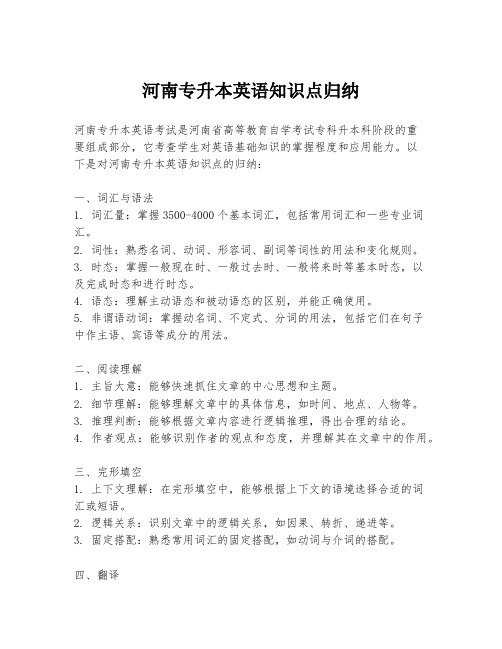
河南专升本英语知识点归纳河南专升本英语考试是河南省高等教育自学考试专科升本科阶段的重要组成部分,它考查学生对英语基础知识的掌握程度和应用能力。
以下是对河南专升本英语知识点的归纳:一、词汇与语法1. 词汇量:掌握3500-4000个基本词汇,包括常用词汇和一些专业词汇。
2. 词性:熟悉名词、动词、形容词、副词等词性的用法和变化规则。
3. 时态:掌握一般现在时、一般过去时、一般将来时等基本时态,以及完成时态和进行时态。
4. 语态:理解主动语态和被动语态的区别,并能正确使用。
5. 非谓语动词:掌握动名词、不定式、分词的用法,包括它们在句子中作主语、宾语等成分的用法。
二、阅读理解1. 主旨大意:能够快速抓住文章的中心思想和主题。
2. 细节理解:能够理解文章中的具体信息,如时间、地点、人物等。
3. 推理判断:能够根据文章内容进行逻辑推理,得出合理的结论。
4. 作者观点:能够识别作者的观点和态度,并理解其在文章中的作用。
三、完形填空1. 上下文理解:在完形填空中,能够根据上下文的语境选择合适的词汇或短语。
2. 逻辑关系:识别文章中的逻辑关系,如因果、转折、递进等。
3. 固定搭配:熟悉常用词汇的固定搭配,如动词与介词的搭配。
四、翻译1. 直译与意译:掌握直译和意译的技巧,能够根据上下文选择合适的翻译方法。
2. 语言特点:理解中英文表达方式的差异,注意语言的准确性和流畅性。
五、写作1. 文章结构:掌握英语写作的基本结构,如引言、正文、结论。
2. 论点论据:能够清晰地表达自己的观点,并提供合理的论据支持。
3. 语言运用:使用恰当的词汇、句型和语法结构,使文章表达准确、流畅。
六、听力1. 听力理解:能够理解听力材料的主旨大意和细节信息。
2. 听力技巧:掌握听力技巧,如预测、关键词捕捉等。
结束语河南专升本英语考试不仅考查学生的语言知识,更考查学生的语言运用能力。
希望以上的知识点归纳能够帮助学生更好地准备考试,提高英语水平。
河南专升本公共英语语法主谓一致和强调句

3. —Wasn’t it Dr. Li__D___spoke to you just now?
—Yes, it was.
A. which
B. what
C. where
D. who
75
4. Was it during the Second World War__C___he died?
A. this
句型2:It is/was+not until+被强调部分+that+其他成分 译为:“就是直到,正是直到......”
Eg: It was not until midnight that I fell asleep. It was not until he came back that I left.
A. is;which
B. was;why C. was;that
2. It was__A___he said at the meeting_____disappointed me.
D. were;how
A. what;that
B. that;that
C. what;what D. that;what
③ it 可指不知对方身份的人。 eg. -Who is knocking at the door?
-It must be Tom. (指身75份不明的人)
【课堂同步练习】
7. Tom’s mother kept telling him that he should work harder, but__D___didn’t help.
75
(2)强调句特点:把 it is/was … that / who 去掉后句子依然完整,it is/ was 后跟介词
河南专升本英语语法复习

河南专升本网真诚·用心服务考生专升本英语语法复习(雨姐破译)时态一.一般现在时一般 + s; 在以 ch, sh, s, x 或 o 结尾的词后 + es (teaches, goes, washes, fixes,guesses); 在以“辅音字母+ y” 结尾的词后,变 y 为 i 后再加-es (studies, tries) 1. 表示现在反复发生的动作或存在的状态,常与 every day, once a week, often, always, usually,sometimes, seldom 等时间状语连用:-We go there twice a month.-Industrial buyers are responsible for supplying the goods and servicesthat an organization required for its operations. (d. required - requires)2. 表示主语的特征、性格、能力等:-He has great concern for others.-Matter exists in three states.3. 表示客观事物或普遍真理:-Light travels faster than sound.-Japan lies to the east of China.4. 表示安排或计划好的将来的动作:-The plane takes off at five.5. 在时间或条件状语从句中表示将来的动作(when, after, before, as soon as, until; if, unless):-If it is fine tomorrow, we will have a football match.-A desert area that has been without water for six years will still bloomwhen rain will come. (will come - comes)二.现在进行时study-studying; come-coming; sit-sitting (forget-forgetting); die-dying通常不能用于现在进行时的常见动词如下:see, hear, smell, taste, know, find, forget, notice, suggest, be, love,like, want, hope, wish, prefer, hate, understand, remember, believe, have, consist, seem.1. 表示此时此刻(说话时)正在进行的动作:-The students are running to the sports-field.2. 表示现阶段正在进行的动作,但此刻不一定在进行:-He is writing a novel this year.3. 可表示将来发生的动作,这一用法常用于 go, come, leave, start 等动词,后面也常用表示较近的将来时间状语,如tomorrow, tonight, this coming Friday 等,表示安排或计划好的事情:-Those visitors are leaving for Wuhan tomorrow.4. 用来给习惯性动作加上赞赏或讨厌等感情色彩:-The boy who is sitting beside me is always asking me a lot of whys andhows.-He was seeing somebody creeping into the house through the open windowlast night.三.现在完成时1.表示动作现在刚完成:-His son has finished his homework.2. 表示过去做的动作对现在仍有影响:-It's so cold in here. Who has broken the window?本资料来源于互联网上,版权归作者所有,仅供考生参考学习,请自觉在下载 24 小时内删除。
河南专升本考试英语语法系列复习专题——动词时态,被动语态

一、一般现在时1.一般现在时表示经常发生、习惯性动作、客观真理、科学事实、格言,目前的特征、状态、能力等。
2.主句是一般将来时,时间、条件状语从句中用一般现在时表示将来。
如:I’ll go there after I finish my work./ If it rains tomorrow,I won’t go there.3.在以here,there开头的句子里,go,come等少数动词的一般在时表示正在发生的动作。
例如:There goes the bell.铃响了。
There comes the bus.汽车来了。
Here she comes.她来了。
二、现在进行时1.表示正在进行的动作。
2.表示按计划安排即将发生的动作。
例如:She is leaving for Beijing.她要去北京。
He is working as a teacher tomorrow.从明天起他要做老师。
My father is coming to see me this Saturday.这个星期六我爸爸要来看我。
3.代替一般现在时,描绘更加生动。
例如:The Changjiang River is flowing into the east.江水滚滚向东流。
The sun is rising in the east.太阳从东方冉冉升起。
4.大多数动词可用于进行时,但也有些动词不用于进行时。
常见的有:exist,live,understand,mean,owe,belong to ,know,doubt,suppose,remember,forget,believe,trust,want,wish,refuse,like,hate,dislike,prefer,mind,hope等。
三、现在完成时1.表示过去发生的动作对现在产生的影响或结果,或说话时已完成的动作。
例如:I have finished the report./ She has cleand the room.2.表示从过去开始,待续到现在的动作或状态,往往和“for…”, “since…”表述的一段时间状语连用。
河南省专升本英语语法解析
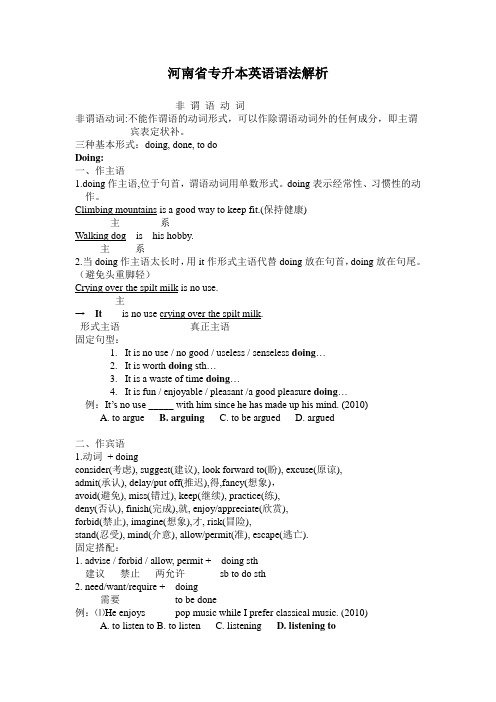
河南省专升本英语语法解析非谓语动词非谓语动词:不能作谓语的动词形式,可以作除谓语动词外的任何成分,即主谓宾表定状补。
三种基本形式:doing, done, to doDoing:一、作主语1.doing作主语,位于句首,谓语动词用单数形式。
doing表示经常性、习惯性的动作。
Climbing mountains is a good way to keep fit.(保持健康)主系Walking dog is his hobby.主系2.当doing作主语太长时,用it作形式主语代替doing放在句首,doing放在句尾。
(避免头重脚轻)Crying over the spilt milk is no use.主→ It is no use crying over the spilt milk.形式主语真正主语固定句型:1.It is no use / no good / useless / senseless doing…2.It is worth doing sth…3.It is a waste of time doing…4.It is fun / enjoyable / pleasant /a good pleasure doing…例:It’s no use _____ with him since he has made up his mind. (2010)A. to argueB. arguingC. to be arguedD. argued二、作宾语1.动词+ doingconsider(考虑), suggest(建议), look forward to(盼), excuse(原谅),admit(承认), delay/put off(推迟),得,fancy(想象),avoid(避免), miss(错过), keep(继续), practice(练),deny(否认), finish(完成),就, enjoy/appreciate(欣赏),forbid(禁止), imagine(想象),才, risk(冒险),stand(忍受), mind(介意), allow/permit(准), escape(逃亡).固定搭配:1. advise / forbid / allow, permit + doing sth建议禁止两允许sb to do sth2. need/want/require + doing需要to be done例:⑴He enjoys _____ pop music while I prefer classical music. (2010)A. to listen toB. to listenC. listeningD. listening to⑵The garden requires_____ . (2009)A. wateringB. being wateredC. to waterD. having watered⑶I appreciate____ to your birthday party. (2003)A. to be invitedB. to have invitedC. having invitedD. being invited⑷I don’t mind____ out for a walk in such a bad weather. (2006)A. goB. to goC. goingD. gone⑸I don’t mind ____ in the office.A. to smokeB. smokedC. his smokingD. smokes注:1.doing的被动形式:being done (第3题只有被动的含义)2.doing的复合结构:在doing前面加形容词性物主代词:his smoking名词所有格:Tom’s smoking代词的宾格形式(口语):him smoking(doing动作的发出者)如果his smoking与him smoking同时出现,选择更加正式的his smoking.3.doing的否定形式:紧挨着doing前加not : not doing例1:I’m sorry for not being there.例2:⑴No one can avoid____ by advertisements. (2008)A. influencedB. influencingC. to influenceD. being influenced⑵What is the reason for ____ on time? (2012)A. not your comingB. you not comeC. your not comingD. you not to come2.作介词宾语(所有的介词后跟动词的-ing 形式)介词:at, for, against, on, by, to, (in)…⑴to为介词的短语:(~to doing)be/get used to = be accustomed to 习惯于get down to 开始做…pay attention to 关注contribute to 有助于devote oneself to 投身于be addicted to 沉溺于look forward to 盼望object to 反对stick to 坚持lead to 导致the key to …的关键confess to 坦白☆prefer的用法:prefer + doing (长期的动作)to do (一次性的动作)prefer to do A rather than do B = prefer doing A to doing B 宁愿做A而不愿做B 例:I prefer walking______. (2007)A. to driveB. to drivingC. than driveD. than driving⑵省略介词in的短语:sb spend 时间(in) doing sth 花(时间)做…sb be busy (in) doing sth 忙于sb have trouble/difficulty/a problem/a hard time (in) doing sth 做…有困难There is no point (in) doing… 做…是没有用的。
河南专升本-英语复习--固定搭配资料

河南专升本-英语复习--固定搭配1.add to =increase 添加,增加add ……to……把……加入……add up 把所有的加起来add up to+数字总计2.answer to 和……一致answer for 对……负责the answer to ……的答案3.break in vi.破门而入break into vt. 闯入break out vi.突然发生break up 拆散break down vi.坏了,抛锚4.cut off 切断;停止供应cut down 砍倒cut out 砍掉e along/on 加油!赶快!come from 来自come up 过来;开花come out 出来;提出come across 偶然遇见come into being 诞生,形成come into power 上台执政6.call for 索要;叫某人同往call at +地点拜访call on +人拜访call in 派人去请某人call up 打电话call out 喊出来call off 取消7.carry out vt.执行,实施carry on vi. 继续8.do with 处理do away with 废除制度习惯等do up 系口子,系鞋带,做头发do business 做生意do sb. good 对……有好处do sb. harm 对……有坏处9.go out 出去;熄灭go over 复习;仔细检查go on 继续go though 通过;观察,检查go up 上升(物价)go off 离开go after 追赶go in for 从事,喜欢go all out to do 全力以赴go bad 变坏go hungry 挨饿go out for a walk 出去散步10.give up 放弃11.give in 屈服give away 送掉,分发(奖品等);放弃(机会等);泄漏(秘密),让步陷下give off 发出(蒸汽,光)give out 分发,发出(气味,热等);发表;用尽,耗尽give way to 让位于,给……让步,让路give forth 发出(气味,声音等);发表11.hold to 坚持hold out伸出hold on 继续坚持hold back 阻止12.keep on doing sth.坚持做某事13.keep up with 赶上keep sth. in mind 记住keep in touch with 练习keep away 离开keep off 勿碰,远离keep……from……阻止……干…… keep out不让……进来……keep one’s promise守若言keep a diary 写日记keep a secret 保密14.look out 小心15.look forward to doing 期待,期盼look on 旁观;看待look through 浏览;仔细检查look into调查look up朝上看;查找look after 照顾look at 看look for 寻找look back 向后看look like 看起来象look over 检查16.live for 为……而活着17.live out度过live up to遵循live on依赖……为生18.make for (无被动语态)走向;袭击,冲向be made from 由…… 制成(看不出原材料)be made of 由…… 制成(能看出原材料)be made into 把……做成某产品make out 辨认出;填写;开列;理解,了解make up 编造(故事,谎言等);化妆;组成,构成,补足(数额)。
河南专升本英语语法关键句型讲解

河南专升本考试英语语法关键句型1. It作先行主语和先行宾语的一些句型例:She had said what it was necessary to say.2. 强调句型例:It is not who rules us that is important, but how he rules us.3. "All+抽象名词"或"抽象名词+itself"(very+形容词)例:He was all gentleness to her.4. 利用词汇重复表示强调例:A crime is a crime a crime.5. "something(much)of"和"nothing(little)of" "something of"相当于"to some extent",表示程度。
在疑问句或条件从句中,则为"anything of ",可译为"有点","略微等。
""译为毫无","全无"。
"much of"译为"大有","not much of"可译为"算不上","称不上","little of"可译为"几乎无"。
something like译为"有点像,略似。
"例:They say that he had no university education, but he seems to be something of a scholar.6. 同格名词修饰是指of前后的两个名词都指同一个人或物,"of"以及它前面的名词构一个形容词短语,以修饰"of"后面的那个名词。
河南专升本英语必掌握知识点

(一)常用介词短语at the cost of 以……为代价by accident 偶然by chance 偶然by no means 绝不by means of 用,依靠in case 万一in no case 决不in case of 万一in light of 鉴于,由于in vain 徒劳in spite of 尽管in light of 鉴于,由于in vain 徒劳in spite of 尽管in regard to 关于,至于in advance 预先in favor of 支持,赞成for the sake of 为了……的利益on purpose 故意on the contrary 相反other than 除了on condition that 如果rather than 而不是regardless of 不管, 不顾in difficulty 处境困难in honor of 为纪念,为庆祝in no way 决不by virtue of 借助于in particular 特别,尤其in/out of place 在(不在)适当位置in place of 取代in proportion to 与……成比例in the face of 即使,在…面前in light of 鉴于,由于in vain 徒劳in spite of 尽管in the way 挡道的in terms of 在…方面,根据in (good) shape 处于良好状态on behalf of 代表on occasions 有时on second thoughts 经重新考虑on the spot 在场,马上on average 平均地on a large scale 大规模地on purpose 故意地on the contrary 相反地behind schedule 晚点ahead of schedule 提前in advance 预先rather than 而不是other than 非,除了to the point 切题,切中要害out of control 失去控制out of touch 失去联系in sight 看得到out of sight 看不见on guard 提防,值班out of/in stock 缺货/现有货的on condition that 如果in favor of 支持,赞成for the sake of 为了……的利益after all 毕竟above all 首先in person 亲自in private 私底下in public 在公共场所in turn 轮流,反过来in return (for) 回报in order 按顺序under/in no circumstances 决不under control 在控制之中under way 在进行中under discussion 在讨论中under construction 在建设中but for 要不是on the basis of 根据on a weekly basis 每周(二)形容词与介词的搭配applicable to 适用于approximate to 接近comparable to 与……可比close to 接近contrary to 与……相反equal to 相当,胜任equivalent to 相当于familiar to 为……所熟悉familiar with 熟悉(三)易混形近词1.economic/economical两者均可表示“经济的”,其区别可简单地概括为:① economic:主要与“财政(即金钱)”有关E.g.:The boy left school for economic reasons.这男孩因经济原因而辍学。
河南专升本英语语法

河南专升本英语语法
河南专升本英语语法考试主要考察学生对英语基础语法的掌握程度,考试难度相当于大学英语四级的水平。
以下是河南专升本英语语法考试中常见的一些语法知识点:
1. 时态和语态:包括一般现在时、一般过去时、现在进行时、过去进行时、将来时(包括will和be going to)、被动语态等。
2. 虚拟语气:包括与现在事实相反、与过去事实相反、与将来事实相反的虚拟语气。
3. 非谓语动词:包括动词不定式、动名词和分词等。
4. 从句:包括名词性从句(主语从句、宾语从句、表语从句)、定语从句和状语从句等。
5. 倒装句:包括部分倒装和完全倒装。
6. 强调句:包括强调谓语、强调主语和强调宾语等。
7. 主谓一致:包括单数主语和复数主语的情况。
8. 情态动词:包括can、could、may、might、must、need等情态动词的用法。
9. 介词和连词:包括常用介词和连词的用法,如in、on、at、for等。
10. 形容词和副词:包括形容词和副词的比较级和最高级的用法,以及修饰名词和修饰动词的情况。
以上是河南专升本英语语法考试中常见的一些知识点,备考时可以结合真题进行练习,掌握常见的考点和题型,提高自己的语法水平。
河南专升本考试英语语法系列复习专题——形容词、副词

河南专升本考试英语语法系列复习专题——形容词、副词1.狠抓基础知识:复习项目:定语从句、动名词、不定式、现在分词、过去分词、动词时态、主谓一致、名词性从句、情态动词、强调句。
2.易混淆词语辨析:1) carry on(vi.)继续;carry out(vt.)实行;实现;执行。
例如:They carried out the plan and carried on with the work.2) lie (lay, lain) down 躺下;lay (laid, laid) down 放下3) in charge of 负责…,in the charge of 由…负责。
例如:I’m in charge of the class.=The class is in the charge of me.4) be angry with/at sb. 生某人气;be angry at/about/over sth.因某事生气;例如:Mother got angry with/at me only because I had broken a precious cup.5) call on sb. 拜访某人;call at sp. 访问某处drop in on sb. 顺便拜访某人;drop in at sp. 顺便拜访某处6) knock on/at sth. 敲某物;knock into sb./sth. 撞上某人/某物。
7) by the way 顺便说;on the way (to)…在去…的路上;in the way 以这种方式,碍事;in sb’s way 碍某人的事例如:By the way, would you please buy me a pen on the way to school?顺便说一下,你上学路上能帮我买支笔吗?If you work in the way you will be in my way.如果你以这种方式工作,那你就碍我的事了。
河南专升本备考资料

河南专升本备考资料考前必背英语公式1. 表示共同所有,只需在后者加’s,表示分别所有,两者都加’s2.a/an/the+名词单数+and +a/an/the+名词单数,表示两个人,作主语时谓语动词用复数a/an/the+名词单数+and+名词单数,表示一个人两种身份,作主语时,谓语动词单数3.OtherThe other 有范围,表特指The others 有范围,表特指=the other+名词复数Others 无范围,表泛指=other+名词复数Another 无范围,表泛指,又一,另一3.It 和that指代“the+名词单数”(可数/不可数),特指,it同一物,that同一类, one指代“a+名词单数”,表泛指.4.A+谓语+as+adj/adv.原级+as+B ( A和B一样)主+谓+too+adj./adv.原级+to do sth. (太.....而不能做...)Adj./adv. +enough+ to do sth. (足够.....能够....)5.A+谓+比较级+than+B (A比B更)比较级+and+比较级(“越来越....”)the +比较级(+主+谓),the +比较级(+主+谓)“越....,越....”主+谓+more+A+than+B.(A. B为adj.),与其说B,不如说A.6.A+谓+倍数+as+adj./adv.原级+as+B(A是B的...倍)ed to do sth. 过去常常做某事(指过去的习惯或状态)Be/get used to doing sth.(习惯于做某事)8.感官系动词(look,smell,taste,sound,feel)和表情感类的词(love, hate,like) 无进行态9.短暂性动词(come,go,leave,finish,die,start,begin)用进行时表将来10.当句中有when,while,as引导的发生在过去的时间状语从句时,长动作中夹杂短动作,长动作用过去进行时,短动作用一般过去时11.when/if为连词,后可跟句子,若连词后无主语,可将when/if 忽略,仍然判断为非谓语作状语12.but原则(前有do 后无to,前无do,后无to)其中do不指动词原形,而是do本身13.与做B相比,更愿意做Aprefer to do A rather than to BWould rather do A than do BWould do A rather than do B14.四看一听一发现一感觉 +宾+do主动,短动作doing主动,长动作done被动(see/watch/observe/notice/hear/find/feel)15.Sb./sthbe said/reported/thought/considered/believed+to do主动未发生+to have done主动已发生+to be done被动未发生+to have been done被动已发生16.最高级/序数词/the only/the very/the last/the just+名词/代词+that引导的定语从句(定从缺成分)17.不定代词+that引导的定语从句(定从缺成分)18.代词/数词+of which/whom ,表示先行词的量19.抽象地点名词(case、point、degree、situation、condition、stage、position、occasion)+where引导的定语从句(定从不缺成分)20.抽象名词(faith、belief、news、information、message、fact、truth、idea、view、thought、question、problem、advice、suggestion、promise、conclusion、fear、dream、evidence)+that 引导的同位语从句(从句不缺成分)21.It is/has been+时间段+since+一般过去时句子It was +时间段+before+一般过去时句子It will be +时间段+before+一般现在时句子22.If=provided=providing=suppose=supposing23.1)despite/in spite of+名词/名词短语;though/although/even if /even though+句子,不与but 连用2)because of /due to /owing to +名词/名词短语because/as/since+句子3)in order to do ; so as to doin order that+句子;so that +句子24.however/no matter how+adj./adv.+主语+谓语whatever/no matter what+n. +主语+谓语25.主语+insist/command/order/advise/suggest/recommend/propose/ ask/demand/require/request/urge/desire+that从句+(should) do(主动)/(should)be done(被动)26.It is adj.(important/significant/vital/essential/necessary/strange/natural/imperative)+that从句+(should) do(主动)/(should) be done(被动)27.I’m sorry/disappointed/surprised+ that从句+should do (主动)/should be done(被动)28.It is(high/about)time(that)+did/was/were29.否定词/否定短语+情态动词/助动词/be动词+主语30.rest/most/some/half/分数/百分数+of +名词/代词,谓语动词单复数和名词/代词保持一致。
专升本英语情态动词河南

专升本英语情态动词河南情态动词在英语中是一个非常重要的语法点,它表示的是说话人的态度或语气,包括推测、可能、需要、意愿等。
在河南的专升本英语考试中,情态动词也是一个常见的考点。
本文将重点讲解情态动词的基本用法和常见考点,以帮助考生更好地备考。
一、情态动词的基本用法情态动词有can、may、must、should、will等,它们后面跟动词原形或动词的-ing形式,表示不同的语气和含义。
下面分别介绍它们的用法:1.cancan表示能力、可能性或推测,相当于汉语中的“能够”、“可以”、“可能”。
例如:I can speak English.(我会说英语。
)It can rain tomorrow.(明天可能会下雨。
)2.maymay表示可能性或允许,相当于汉语中的“可能”、“可以”。
例如:She may come tomorrow.(她明天可能会来。
)You may go now.(你现在可以走了。
)3.mustmust表示必须或推测,相当于汉语中的“必须”、“一定”。
例如:You must finish your homework.(你必须完成作业。
)It must be raining now.(现在一定在下雨。
)4.shouldshould表示建议或应该,相当于汉语中的“应该”、“应当”。
例如:You should eat more vegetables.(你应该多吃蔬菜。
)We should arrive at 8 o’clock.(我们应当在8点到达。
)5.willwill表示意愿或将来,相当于汉语中的“愿意”、“将要”。
例如:I will help you.(我愿意帮助你。
)He will be late for work.(他将会迟到。
)二、情态动词的常见考点在河南的专升本英语考试中,情态动词的常见考点包括:情态动词的时态变化、情态动词与其他动词的搭配使用、情态动词表示推测的用法等。
下面分别进行讲解:1.情态动词的时态变化情态动词有时态的变化,包括现在时、过去时、将来时等。
河南省专升本英语语法专项练习题15

河南省专升本英语语法专项练习题151. It is important that the boy()an adult to take care of him.A、haveB、hadC、hasD、having参考答案:A参考解析:【翻译】重要的是有个大人来照顾这个小男孩。
[考点]虚拟语气【精析】A It is important that引导的主语从句中常用虚拟语气,谓语动词的形式为“should+动词原形”,且should可以省略。
故选A。
2. We arranged to meet at the station but she did not().A、break upB、turn upC、bring upD、set up参考答案:B参考解析:【翻译】我们原计划在车站见面,但她没有出现。
[考点]词义辨析【精析】B break up:打碎,结束,解散;turn up:出现;bring up:提出,教育,培养;set up:建立。
根据句意可知,选B。
3. The manager often requires us never to _____ till tomorrow what we can do today.A、come upB、put offC、turn onD、give out参考答案:B参考解析:【翻译】经理经常要求我们不把今天能做的事推迟到明天。
[考点]词组辨析【精析】B come up:走近,引起注意,put off:推迟,使延期;turn on:打开(开关);giveout:分发。
根据句意,选B。
4. I have heard a lot about him _____ I came back from abroad.A、sinceB、untilC、beforeD、when参考答案:A参考解析:[翻译]回国之后我听说了关于他的不少事情。
[考点]连词辨析【精析】Asince意为“自从……以来”,后接时间状语从句时,从句谓语动词用一般过去时,主句的谓语动词用现在完成时,故选A。
河南专升本:语法系列复习专题二-----代词
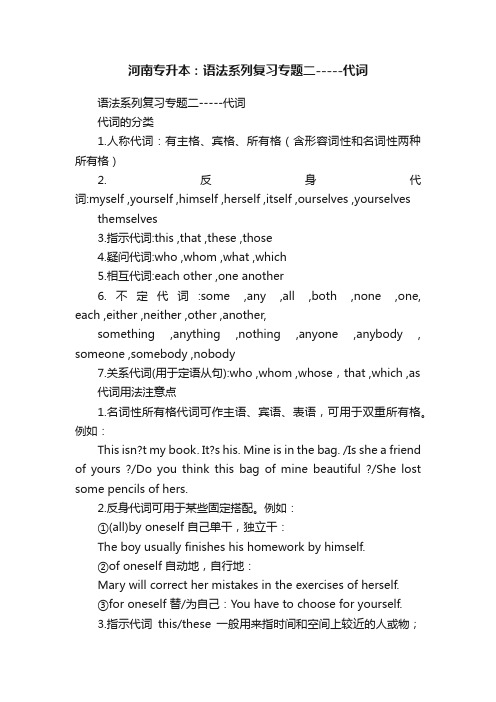
河南专升本:语法系列复习专题二-----代词语法系列复习专题二-----代词代词的分类1.人称代词:有主格、宾格、所有格(含形容词性和名词性两种所有格)2.反身代词:myself ,yourself ,himself ,herself ,itself ,ourselves ,yourselves themselves3.指示代词:this ,that ,these ,those4.疑问代词:who ,whom ,what ,which5.相互代词:each other ,one another6.不定代词:some ,any ,all ,both ,none ,one, each ,either ,neither ,other ,another,something ,anything ,nothing ,anyone ,anybody , someone ,somebody ,nobody7.关系代词(用于定语从句):who ,whom ,whose,that ,which ,as代词用法注意点1.名词性所有格代词可作主语、宾语、表语,可用于双重所有格。
例如:This isn?t my book. It?s his. Mine is in the bag. /Is she a friend of yours ?/Do you think this bag of mine beautiful ?/She lost some pencils of hers.2.反身代词可用于某些固定搭配。
例如:①(all)by oneself 自己单干,独立干:The boy usually finishes his homework by himself.②of oneself 自动地,自行地:Mary will correct her mistakes in the exercises of herself.③for oneself 替/为自己:You have to choose for yourself.3.指示代词this/these一般用来指时间和空间上较近的人或物;that/those 常指时间和空间上较远的人或物。
河南专升本英语:语法复习专题六-情态动词、主谓一致

河南专升本英语:语法复习专题六-情态动词、主谓一致语法系列复习专题六-----情态动词、主谓一致情态动词一、一般疑问句中几个情态动词的问与答1. Need I/he/…?Yes,you/he/…must.(不用need)2. Must I/ he/…?No,you/ he/…needn’t/don’t(doesn’t,won’t)have to.(不用mustn’t)3. May I/ he/…?No,you/ he/…mustn’t.(少用may not)4. Could(Can)you…?Yes,I can (不用could)5. Shall I/she/ he…?No,you(she,he)needn’t/can’t/mustn’t二、情态动词表“推测”1.can,may,must使用的句式:1)肯定陈述句中:must表“肯定、必定、一定”意,may/might 表“也许,或许”意。
2)否定陈述句中:can’t/couldn’t表“不可能”意,may not/might not表“也许不、可能不”意。
3)疑问句中:只能用can或could,不能用must,may或might。
注意:表推测的could,might并不是指过去时间,而是表示比can,may把握性略小些的情况。
2.对目前状态的推测:1)must/may/might/can/could+be+表语例如:She must be a teacher.她肯定是老师。
She can’t/couldn’t be a doctor.她肯定不是医生。
He may not/might not be a doctor.他可能不是医生。
2)must/may/might/can/could+一些不能用于进行时的静态动词(如:have,exist,live,like,hate,own,belong to等)例如:She must have her own car,for she has a lot of money.That kind of bird may live in the valleys.3.对目前正在发生的事情进行推测:句式:must/may/might/can/could+be doing例如:They must be waiting for us.他们肯定正在等我们。
(NEW)河南专升本英语语法怎么学
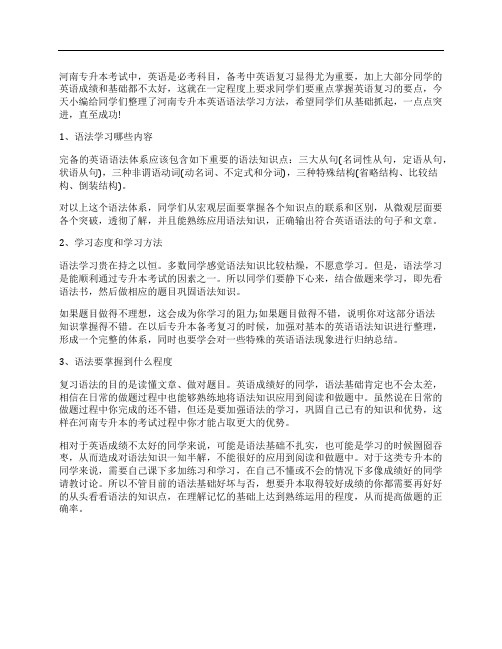
河南专升本考试中,英语是必考科目,备考中英语复习显得尤为重要,加上大部分同学的英语成绩和基础都不太好,这就在一定程度上要求同学们要重点掌握英语复习的要点,今天小编给同学们整理了河南专升本英语语法学习方法,希望同学们从基础抓起,一点点突进,直至成功!1、语法学习哪些内容完备的英语语法体系应该包含如下重要的语法知识点:三大从句(名词性从句,定语从句,状语从句),三种非谓语动词(动名词、不定式和分词),三种特殊结构(省略结构、比较结构、倒装结构)。
对以上这个语法体系,同学们从宏观层面要掌握各个知识点的联系和区别,从微观层面要各个突破,透彻了解,并且能熟练应用语法知识,正确输出符合英语语法的句子和文章。
2、学习态度和学习方法语法学习贵在持之以恒。
多数同学感觉语法知识比较枯燥,不愿意学习。
但是,语法学习是能顺利通过专升本考试的因素之一。
所以同学们要静下心来,结合做题来学习,即先看语法书,然后做相应的题目巩固语法知识。
如果题目做得不理想,这会成为你学习的阻力;如果题目做得不错,说明你对这部分语法知识掌握得不错。
在以后专升本备考复习的时候,加强对基本的英语语法知识进行整理,形成一个完整的体系,同时也要学会对一些特殊的英语语法现象进行归纳总结。
3、语法要掌握到什么程度复习语法的目的是读懂文章、做对题目。
英语成绩好的同学,语法基础肯定也不会太差,相信在日常的做题过程中也能够熟练地将语法知识应用到阅读和做题中。
虽然说在日常的做题过程中你完成的还不错,但还是要加强语法的学习,巩固自己已有的知识和优势,这样在河南专升本的考试过程中你才能占取更大的优势。
相对于英语成绩不太好的同学来说,可能是语法基础不扎实,也可能是学习的时候囫囵吞枣,从而造成对语法知识一知半解,不能很好的应用到阅读和做题中。
对于这类专升本的同学来说,需要自己课下多加练习和学习,在自己不懂或不会的情况下多像成绩好的同学请教讨论。
所以不管目前的语法基础好坏与否,想要升本取得较好成绩的你都需要再好好的从头看看语法的知识点,在理解记忆的基础上达到熟练运用的程度,从而提高做题的正确率。
- 1、下载文档前请自行甄别文档内容的完整性,平台不提供额外的编辑、内容补充、找答案等附加服务。
- 2、"仅部分预览"的文档,不可在线预览部分如存在完整性等问题,可反馈申请退款(可完整预览的文档不适用该条件!)。
- 3、如文档侵犯您的权益,请联系客服反馈,我们会尽快为您处理(人工客服工作时间:9:00-18:30)。
河南专升本网 真诚·用心服务考生专升本英语语法复习(雨姐破译)时态一.一般现在时一般 + s; 在以 ch, sh, s, x 或 o 结尾的词后 + es (teaches, goes, washes, fixes,guesses); 在以“辅音字母 + y”结尾的词后,变 y 为 i 后再加-es (studies, tries) 1. 表示现在反复发生的动作或存在的状态,常与 every day, once a week, often, always, usually,sometimes, seldom 等时间状语连用:-We go there twice a month.-Industrial buyers are responsible for supplying the goods and servicesthat an organization required for its operations. (d. required - requires)2. 表示主语的特征、性格、能力等:-He has great concern for others.-Matter exists in three states.3. 表示客观事物或普遍真理:-Light travels faster than sound.-Japan lies to the east of China.4. 表示安排或计划好的将来的动作:-The plane takes off at five.5. 在时间或条件状语从句中表示将来的动作(when, after, before, as soon as, until; if, unless):-If it is fine tomorrow, we will have a football match.-A desert area that has been without water for six years will still bloomwhen rain will come. (will come - comes)二.现在进行时study-studying; come-coming; sit-sitting (forget-forgetting); die-dying通常不能用于现在进行时的常见动词如下:see, hear, smell, taste, know, find, forget, notice, suggest, be, love,like, want, hope, wish, prefer, hate, understand, remember, believe, have, consist, seem.1. 表示此时此刻(说话时)正在进行的动作:-The students are running to the sports-field.2. 表示现阶段正在进行的动作,但此刻不一定在进行:-He is writing a novel this year.3. 可表示将来发生的动作,这一用法常用于 go, come, leave, start 等动词,后面也常用表示较近的将来时间状语,如tomorrow, tonight, this coming Friday 等,表示安排或计划好的事情:-Those visitors are leaving for Wuhan tomorrow.4. 用来给习惯性动作加上赞赏或讨厌等感情色彩:-The boy who is sitting beside me is always asking me a lot of whys andhows.-He was seeing somebody creeping into the house through the open windowlast night.三.现在完成时1.表示动作现在刚完成:-His son has finished his homework.2. 表示过去做的动作对现在仍有影响:-It's so cold in here. Who has broken the window?本资料来源于互联网上,版权归作者所有,仅供考生参考学习,请自觉在下载 24 小时内删除。
第 1 页共 19 页河南专升本网 真诚·用心服务考生3. 过去某时开始的动作一直延续到现在(这时常和 since 或 for 短语连用)-Li has studied English for twenty years.-Collecting dolls as a hobby becomes increasingly popular during the pastfifty years.b[注] 1.副词用:just, before, already, often, never, ever, always, not...yet 或now, today, this week 等;不用过去的时间状语。
2.-His grandmother ______ for thirty years.a. diedb. had diedc. has been deadd. has died-He has been in the army for two years. (不能说 He has joined the army for ...)-I a college student for more than a year.a. becameb. have becomec. wasd. have been-It is three years since he sent to the U.S.(不能说 He has gone to the U.S. for three years.)四.一般过去时时间状语有: yesterday, ago, in 1978, once, last week (month, year), at that time, just now 等,以及由 when 等引导的句子。
1. 表示某一确定的过去时间发生的动作或存在的状态:-Oberlin College awards degrees to both sexes in 1837, but coeducaion in Americanacolleges did not spread until the second half of the century. (awards - awarded)2. 表示过去某一段时间内经常发生或习惯的动作:-From 1910 to 1927 Corra Harris ______ out an average of a novel a year.a. has broughtb. were bringingc. had broughtd. brought3. used to:-We used to get up at five every morning when we were in the countryside. 五.过去进行时表示过去某一时刻或某个阶段正在进行的动作或正发生的历史事件。
-Bill said that he ______ his homework at half past seven yesterdayevening.a. didb. was doingc. is going to dod. has done六.过去完成时1.结束性动作--即“已完成”,表示在过去某一时间之前就已完成了的动作。
常有 by, before, until, as soon as, when, because 等引导的短语或从句,表示过去的时间。
-By the end of last year, he had learned about 1,000 words.Preposition (G)1. in, on, at yesterday morning in the morning tomorrow morning yesterday afternoon in the afternoon tomorrow afternoon yesterday eveningin the evening tomorrow eveningthis morningthis afternoon at dawn this evening at noon at nightBefore 'day' we use 'on': on Sunday (Monday..) on Sunday morningon Oct. 1 on the afternoon of Oct. 1on May Day on the morning of May Day本资料来源于互联网上,版权归作者所有,仅供考生参考学习,请自觉在下载 24 小时内删除。
第 2 页共 19 页河南专升本网 真诚·用心服务考生on National Day on the evening of National Day on Christmas on Christmas eveon a cold winter morning, on a hot June afternoon, etc. In the concept of space: arrive in New York; arrive at the stationin London, Tokyo, etc. but at the bus stop2. over on above 超过(或低于)某高度、标准。
under beneath below e.g. above the sea level (海拔)直上,直下(接触表面的)上下below O degree3. except 1. They all went to sleep except the young Frenchman.2. He rarely went anywhere except to his office.3. The windows were never opened except to air the room for a few minutesin the morning.besides Besides English, he has to study German and French.except for 1. The room was bare of furniture except for a few chairs.2. The composition is good except for a few spelling mistakes.except that (when, after, etc.)1. This suit fits me well except that the trousers are too long.2. It's a satisfactory hat, except that it doesn't fit me.3. Mr. Smith used to go fishing every weekend except when he was ill.1. The art exhibition was well designed, the disarrangement of a fewpieces of photos.a. exceptb. besidesc. except ford. in addition to2. She hurried when she knew that everybody was ready ______ her.a. exceptb. except forc. besided. besides3. ______ being used in industry, laser can be applied to operations in the hospital.a. Except forb. Except thatc. In addition tod. Beside4. ______ coal, the most important natural fuels are gas and oil.a. Except forb. Exceptc. Besidesd. Beside(Apart from)5. At the far side of the yard there was a kitchen garden (菜园), and ______ that was the orchard (果园). (再过去是果园)a. apart fromb. exceptc. except ford. beyond6. The compositions by the freshmen class are well-written ______ a fewerrors in spelling and grammar.a. unlessb. except thatc. except ford. besides1. Uncountable nouns:Nouns (G)advice, anger, applause, baggage (luggage), cake, chalk, chocolate, cloth, clothing, bread, damage, equipment, evidence, food, fruit, furniture, gold, homework, housework, information, ink, jewellery,knowledge, machinery, mail(邮件), money, music, news, paper, personnel, postage (邮资,邮费), protection, rice (salt, sugar, tea), scenery, soap,sugar, toothpaste, traffic, transportation, weaponry, weather, work.2. 有些不可数名词以复数形式出现时,其含义会发生变化。
